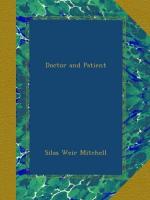The doctor who gives much medicine and many medicines, who is continually changing them, and who does not insist with care on knowing all about your habits as to diet, mealtimes, sleep, modes of work, and hours of recreation, is, on the whole, one to avoid. The family doctor is most of all apt to fail as to these details, especially if he be an overworked victim of routine, and have not that habitual vigilance of duty which should be an essential part of his value. He is supposed to have some mysterious knowledge of your constitution, and yet may not have asked you a medical question in months or years. Too much is taken for granted, and inefficient opinions are the outcome of carelessness. Every new case in a household should be dealt with as if it were a stranger’s, and outside familiarity should not be allowed to breed contempt of caution in study or lead to half measures. Every consultant will agree with me that this kind of social nearness of the doctor to his patient is a common cause of inert advice, and nowhere more distinctly so than when unwise physicians attempt to practise in their own households on those they love.
There are very few instances of chronic ailments, however slight, which should not be met by advice as to modes of living, in the full breadth of this term; and only by a competent union of such, with reasonable use of drugs, can all be done most speedily that should be done. I have said “with use of drugs,” for I am far from wishing to make any one believe that medicines are valueless. Nor do I think that the most extreme dosing employed nowadays by any one is as really hurtful as the neglect to urge efficiently the value of definite hygienic means. There are, indeed, diseases which can only be helped by heroic measures; but, in this case, were I the patient, I should like to be pretty certain as to the qualifications of my hero.
The popular view of the great hurtfulness of drugs is curiously fallacious. I have spoken above more of their relative usefulness, as compared to other means of relief, than with any desire to convince my readers that they are such terrible things as some kinds of practitioners would have us to believe. The dread of their employment is a relic of the time of reaction against the senseless and excessive dosing with calomel and strong purges, and nowadays, even as regards bleeding, once wholly abandoned, it is clear that it still has at times its uses, and valuable ones, too. As medicines are now employed, even by the thoughtless, it must be rarely that they give rise to permanent injury. Let any physician who reads these lines pause and reflect how many times in his life he has seen lasting or serious evil results from drugs.
Accidents happen, but they are the offspring of carelessness. Sometimes, also, unexpected and temporary extreme results surprise us, as when an opiate purges, or five grains of an iodide prove to be gravely poisonous. These occurrences are due to individual peculiarities, which we can as yet neither explain nor anticipate. One man can take opium with almost the impunity which belongs naturally to birds. Another is put to sleep by the dose you give a baby. All this teaches caution, but it is not a matter for blame when it gives rise to alarming consequences, and happily these cases of what we call idiosyncrasies are exceptionally uncommon.




